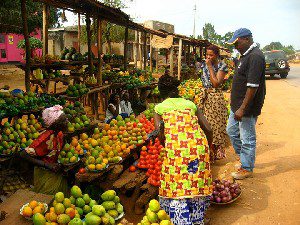
In 2012 when Kampala Capital City Authority (KCCA) evicted vendors from the streets Richard Kamukama was among those affected.
Kamukama was vending vegetables along Datsun Street, near Radio One. Out of the vending business, he was able to pay rent, feed his family and pay school fees for his two sons.
But hell broke loose when KCCA evicted vendors from the streets. But Kakamuka got another chance to life when KCCA bought stalls at USAFI Market and relocated former city vendors there.
“I contacted my friends to book the stalls in USAFI market. After a few weeks, we went and registered. We also paid UGX100,000 as monthly market dues,” Kakamuka narrates.
In order to eliminate street vending, KCCA also embarked on planning to construct seven modern markets in the five city divisions, to create space for about 22,800 vendors.
The project was estimated to cost UGX250 billion. The funds were used to construct markets in Ntinda, Kitintale , Busega, Kasubi, Nakulabye, Kasubi and Ggaba.
Kakamuka together with other former vendors were optimistic that they were to reap more than when they were operating on the streets.
“I abandoned vegetable business for selling clothes. For the first few months, I registered low returns and regregreted why I ventured into this business,” he said.
Part of the reason why business at USAFI market was moving slowly was because of the location of the market. City dwellers found it difficult to access the market. USAFI Market is located along Entebbe Road in Kisenyi, a city suburb.

Some vendors returned on the streets, complaining that the space in USAFI and Wandegeya markets were not enough to accommodate them.
To crack down on the illegal trade, KCCA’s executive director Jennifer Musisi warned that vendors and dwellers alike were to face prosecution. The dwellers were to be arrested for buying goods from the vendors, operating on the streets.
Indeed, the operation to arrest those buying on the streets kicked off, though it did not last long.
It was until KCCA created a taxi park at USAFI market that the vendors situation was salvaged.
Commutter taxis ferrying passangers to Nsambya, Kansanga, Ggaba, Natete, Mengo, were relocated to operate at USAFI market. Vendors started to get many customers.
Vendors complain
The impeachment of Lord Mayor Erias Lukwago in November 2013, coupled with the eviction of vendors and demolishing of illegal structures in the city, affected NRM party, to the extent of losing all the positions in Kampala to FDC and DP.
NRM party lost over 25 councillorship seats at City Hall and at the division positions, as a move analysts say the dwellers made to punish Museveni for hiring Musisi, who employed ruthless methods to evict them.
Museveni realized this. And during the press conference he held after declaring the winner, he blamed his lose in Kampala on Musisi and her team.
To regain his popularity, in June last year, Museveni appointed Beti Kamya, as the Kampala Minister, replacing Frank Tumwebaze. After few weeks in office, USAFI market vendors petitioned Kamya, complaining that all the stalls were being occupied by some KCCA officials and some former city councillors.
Kamya promised to probe the issue and threatened to establish a commission of inquiry to investigate wrangles in the city markets.
When contacted, Peter Kaujju, KCCA spokesperson denied KCCA staff running business at the USAFI market. He also says KCCA employees are professional individuals, who can’t get involved in such.
The matter was also tabled in Parliament by Makindye East legislator Ibrahim Kasozi, demanding MPs probe it.
Other city markets
The process of constructing the markets in the city kicked off by buying the land. Markets were constructed in the five divisions, except Busega, which is not yet completed. Lukwago recently asked the technical wing of KCCA led by Musisi to show the accountability for the sh250b allocated to construct the city markets.
“We are still waiting for the accountability report. Musisi has an obligation to present a report on this matter,” Lukwago says.
On the issue of Busega Market, Lukwago says Musisi told them that the money got over and the market stalled.
Visiting Busega Market this week, one meets a shell building with overgrown grass. Its construction stopped in 2015 at beam level and neighbours say some goats come and graze there.
Some vendors operating on the Northern by-pass had hoped that when the modern market is opened for business soon, they were to operate there.
“During rainy seasons, I suffer a lot and my milk at times goes bad. I thought at this time I would be operating at the market,” says Hassan Kato, a milk seller, at Busega round about.
The Wandegeya Market renovation was concluded in 2014, complete with modern facilities like banking institutions and other services.
Before one was allowed to operate there, they had to sign tenancy agreement with KCCA, a move some vendors refused to accept, terming it as unfair.
According to the tenancy agreement signed by a one Moses Kaddu, a second clothes vendor, that this reporter saw, Kaddu secured a 10 year renewable lease.
“And I pay UGX250,000 as rental fee per month. I cannot afford it because second clothes business here is not on high demand,” Kaddu adds.
Due to limited customers, some vendors are forced to vend around Wandegeya round about, especially traffic lights, when there is jam in the evening.

KCCA enforcement team does not give them space to operate. The team patrons the area, engaging in running battles with vendors and those who are unlucky get their goods confiscated.
Though the Ggaba Market, near the landing site, is fully occupied, its hygiene is poor. Some vendors blame the fishermen for not keeping the area clean.
“We embarked on arresting whoever is found littering t area with garbage,” Alice Namuli, the officer in charge of hygiene at Ggaba Market, said.
Allan Gabula, a matooke vendor, blames the market leadership for failing to maintain the hygiene and yet they solicit money from the vendors to clean the area.
Trade order
Last Friday, Olivia Basemera, a street vendor jumped into Nakivubo Channel and died on spot as she tried to escape from the KCCA enforcement team, who wanted to arrest her. This is the second person to die under almost similar circumstances.
In 2015, a toddler the late Ryan was run over and had his head crushed. The mother had been arrested by KCCA enforcement for vending on the street.
This sparked demonstration among the vendors, forcing KCCA to apologize and compensate the mother.
O Wednesday this week, Lukwago convened a special authority meeting at City Hall to discuss among other things the trade order.
Under KCCA Act, the authority has the mandate to implement the trade order. This means KCCA has to block any one from conducting illegal business in the city, through arresting the culprits and produce them in the courts of law.
Before the authority meeting started, Lukwago told this reporter that it is hard to implement trade order when KCCA has not established enough markets in the city to accommodate the street vendors.




